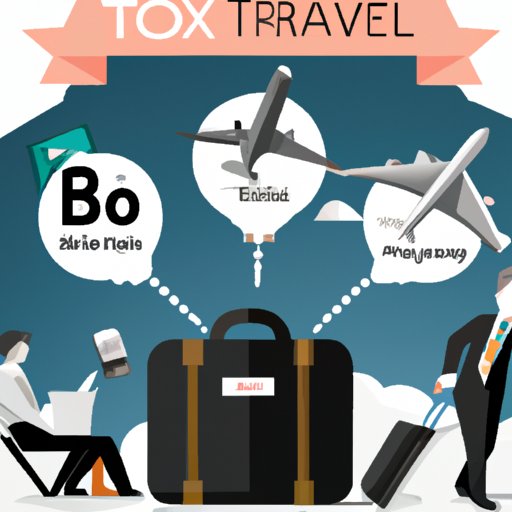Introduction
A business trip is defined as a trip taken for work-related purposes that requires an employee to be away from their home office or usual place of work. The purpose of this article is to explore what qualifies as a business trip and provide an in-depth look at the various aspects of business travel, such as tax benefits, reimbursable expenses, cost considerations, factors to consider when planning a business trip, necessary documentation, and how to maximize efficiency and productivity while on the road.
Defining the Criteria for Business Trips
When determining whether or not a trip qualifies as a business trip, it’s important to consider the purpose of the trip. According to the IRS, “The expense must be ordinary and necessary to the development or maintenance of the taxpayer’s business.” To qualify as a business trip, there must be a legitimate business purpose behind the travel and the expenses must be directly related to the purpose of the trip. Examples of business trips include attending conferences, seminars, meetings, or trade shows; visiting clients or customers; conducting research; or training employees.

Exploring Tax Benefits of Business Travel
One of the major advantages of business travel is the potential to save money on taxes. According to the IRS, “The cost of meals, lodging, and certain other expenses incurred while traveling away from home on business are generally deductible.” In order to take advantage of these deductions, it’s important to keep track of all expenses related to the trip and document them accordingly. This includes receipts, invoices, and other records that can be used to prove the expenses were necessary and directly related to the business trip.
What is Considered Reimbursable on a Business Trip?
Most companies have policies in place regarding what expenses are considered reimbursable on a business trip. Generally speaking, typical expenses related to business travel include transportation (airfare, train tickets, gas, etc.), lodging, meals, and other miscellaneous expenses. It’s important to note that companies may have different rules and regulations regarding reimbursement, so it’s important to check with your employer before incurring any expenses.

Analyzing the Cost of Business Travel
When budgeting for business travel, it’s important to take into account the various costs associated with the trip, such as transportation, lodging, food, and other miscellaneous expenses. Additionally, there are ways to save money on business travel, such as booking flights in advance, taking advantage of discounts and loyalty programs, and being mindful of meal expenses. According to a study by the Global Business Travel Association, “Travelers who book at least one month in advance can save up to 10% on airfare.”

Factors to Consider When Planning a Business Trip
When planning a business trip, there are several logistical considerations to take into account, such as booking flights and hotels, renting a car, and scheduling meetings. Additionally, it’s important to manage your time effectively in order to make the most of the trip. According to a survey conducted by the American Management Association, “Eighty-four percent of business travelers reported that they are able to get more work done while traveling than they would be able to do in their office.”
Identifying Necessary Documentation for Business Travel
In addition to keeping track of expenses and documenting them, it’s important to identify the necessary documentation for business travel. Depending on the destination, this could include a passport, visa, driver’s license, and other forms of identification. Additionally, it’s important to keep track of all paperwork related to the trip, such as boarding passes, itineraries, receipts, and invoices.
How to Maximize Efficiency and Productivity on Business Trips
Business trips can be stressful, but with proper planning and preparation, you can maximize your efficiency and productivity while on the road. Tips for staying organized include packing light, making sure to bring all necessary documents, and setting up a workspace in your hotel room. Additionally, it’s important to plan ahead and set realistic goals for each day of the trip in order to make the most of your time.
Conclusion
In conclusion, business trips can be beneficial for both employers and employees. To get the most out of a business trip, it’s important to understand the criteria for a business trip, take advantage of tax benefits, stay aware of reimbursable expenses, budget appropriately, consider all factors when planning, have all necessary documentation, and maximize efficiency and productivity while traveling. With careful planning and preparation, business trips can be a great opportunity to further your career goals and establish relationships with colleagues.
(Note: Is this article not meeting your expectations? Do you have knowledge or insights to share? Unlock new opportunities and expand your reach by joining our authors team. Click Registration to join us and share your expertise with our readers.)
